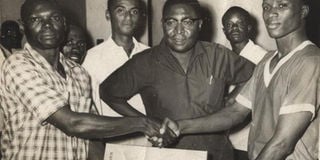Kitonsa: A striker who was an extraordinary goal machine

Kitonsa (right) receiving a reward for the 54 goals he scored in 18 matches in 1964. In the middle is Express founder the late Jolly Joe Kiwanuka. To the right of Kiwanuka is Ali Bablo, a former Express player and official.
courtesy photo
What you need to know:
milestone: Kitonsa emerged the top scorer of the first ever National football league staged in 1968
Some Ugandan soccer experts without doubt rate him as the most prolific goal scorer the country has ever produced. The former Cranes , Express FC and Zamalek FC striker passed on last week after a long illness.
Ali Kitonsa “Simba ya Uganda” will forever be remembered for the 1964 season when he scored 54 goals in 18 matches-an average of three goals per match. In all, he is believed to have scored a total of 102 goals in both competitive and friendly matches played, which could be a world record of some sort.
Those who saw Kitonsa in action describe him as having been a joy to watch. “At 5ft 6in, he was diminitive, thus compesating his size with speed and finishing the ball into the opponent’s net with precision,” recalls veteran sports journalist, Douglas Nsubuga.
According to Nsubuga, during Kitonsa’s time speed work was mainly done by compatriots like Jimmy Ssewava “Omulogo” ( the magician), John Kaddu the inventor of “screw” passes and compounded by remarkable play makers in Charles Jaggwe, Jimmy Semugabi and Abdu Karim Kiggundu.
During his days, Ali Kitonsa played for the Cranes, Express and Zamalek of Egypt. He was capped over 30 times for Uganda and was nicknamed “Simba ya Uganda” (The lion of Uganda) in Kenya and Tanzania. At Express, Kitonsa is remembered as a man who never missed a single game. He played for the club from 1959 to 1979, scoring over 200 goals.
Kitonsa’s soccer talent was first spotted in 1958 by the late veteran journalist, politician and sports administrator Jolly Kiwanuka, (simply known as Jolly Joe) when playing for Kibuli secondary school during a friendly match with King’s College Buddo. Jolly Joe was so impressed with Kitonsa’s skills that he couldnt let him slip away. The following year (1959) when Jolly Joe formed Express, he invited Kitonsa to join him, becoming one of the very first eleven players to play for the club. In the team were others like John Ndidde, Kyeyune Willy Mukasa, Noah Mbowa, Naphtali Ntege and Abdu Karim Ntege.
Five-goal show
But it was not until the early sixties that Express started competing in the second division of the national football league. In 1963 the Cranes beat Zanzibar 8-0 in the Gossage Cup (now CECAFA) with Kitonsa scoring five goals.
Two supporters of Zamalek FC of Egypt were at the time visiting Uganda and requested Kitonsa and Kiggundu to travel to Egypt with them where they later got a professional engagement. They played for Zamalek for several months and later returned to Express, making them the first Ugandan football professionals.
On returning to Uganda, Kitonsa emerged the top scorer of the first ever National football league staged in 1968. That year Express beat Kilembe Mines FC 14-0 in the first round match played at Nakivubo.
In the final match of the season they again played Kilembe away where they needed just a point to lift the league. Kilembe beat Express 1-0 to hand the trophy to Prisons FC. Kitonsa will also be remembered for the 1974 league match when he substituted himself after scoring an all-important winning goal, an action that prompted coach Robert Kiberu to drop his cigaratte in disbelief .
In 1964 Kitonsa was part of the Express FC team that played a friendly match against the Nigerian national football team then nicknamed the Green Eagles. The Nigerians visited Uganda on their way to the Nations Cup when Express beat them 3-1 with Kitonsa scoring two goals. That very day, Express became known as the “Red Eagles” since they had beaten the Green Eagles. Again in 1964, Kitonsa scored four goals in Uganda’s 5-1 drabbing of Egypt that took Uganda to the All Africa Games in Congo Brazaville.
Ali Kitonsa was born to Asuman Kitaka Lumaama and Safina Nagujja at Kankesa, Butambala district on May 12, 1939. He started playing football during 1950s when joined Kitagobwa primary school and later Kibuli secondary school.
He came from a sporting family where his sister Fatia Kitaka was part of the She Cranes netball team that featured in the 1979 World Netball Cup hosted by Trinidad and Tobago.
He was married to Rehema Kitonsa with whom he has had several children. May his soul rest in peace.




